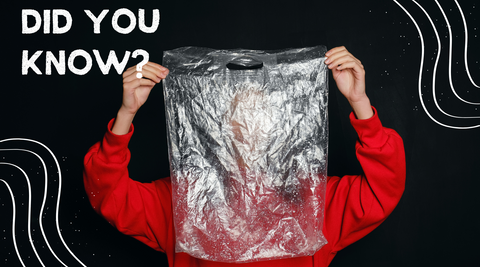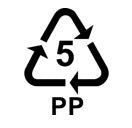Plastics are an important component of modern society, with uses across several industries and products. Plastics are made by either using fossil fuel based products like crude oil, natural gas or coal ('synthetic'), or using renewable products such as carbohydrates, starch, vegetable fats and oils, bacteria and other biological substances ('biobased'). While demand for bioplastics is increasing, synthetic plastics are the predominant choice for most businesses, because of the ease in manufacturing them. However, it must be noted here that while bioplastics may be manufactured from renewable sources, they may not necessarily be more environment friendly than synthetic plastics. This is because some plastics are less biodegradable than others, even when they come from biobased sources.
The word plastic refers to a substance capable of moulding, and comes from 'plasticus' (Latin for 'capable of moulding') and 'plastikos' (Greek for 'fit for moulding').
Which plastic is right for my business?
Since several types of plastics exist, businesses that require the use of plastics in their offerings must carefully consider certain factors, before deciding on the most appropriate type of plastic for their needs. These factors are: use case, physical properties, safety, environmental sustainability.
Use Case
The application of the plastic is the principal determinant of the type of plastic a business should select. Defence and protection services agencies require materials that can withstand impacts from high velocity projectiles such as bullets, shrapnel, etc. So, in this case plastics with high density are more suitable, as they can prevent these projectiles from passing through. Once the use case is well understood, then businesses must focus on which properties are most suitable for their needs between the different types of plastics that can satisfy their use case.
Properties
Various types of plastics offer differing properties. E.g., while some plastics are very lightweight and stretchable, others are heavy and rigid. Consequently, the choice of plastic is based principally on its usage. Single use shopping bags offered by grocers use plastic that is of the first type, while food containers use plastic of the second type. Further, plastics can share characteristics, but also have differing properties. For example two plastics can be similarly sturdy, but one can be more flexible than the other. So the former type would be more useful in making ketchup lid hinges than the latter, because it can withstand the repeated bending created by opening and closing the lid. Once the business shortlists possible plastics based on use case and properties, then it must determine whether the plastic is safe for the use case in question.
Safety
Because of their chemical compositions, plastics behave differently in similar environments. E.g., some plastics melt easily at high temperatures, and so should not be used in applications where lots of heat or friction is generated. Similarly, some plastics decompose quickly, and release harmful chemicals in the process. Such plastics endanger customers' safety, if used in products such as food containers. So, business must carefully consider this aspect as well. Finally, business must also consider the impact of their choice of plastic on the environment.
Sustainability
Certain plastics are more environment friendly than others. This is due to several factors, such as biodegradability and environmental impact of manufacturing the plastic. Modern business must carefully choose plastics that meet their requirements, but that are also the most sustainably produced, have a low carbon footprint, and can be disposed of safely after use.
These factors together determine the most appropriate plastic a business can use for its offerings. Polypropylene is one such plastic available today that is both safe and sustainable, and its usage is paving the way towards a more sustainable future.
Polypropylene
First developed in 1951, polypropylene has since been used in a variety of applications, and is a prominent choice across several industries. Polypropylene's compositional properties, as well as its environment friendly nature make it a popular choice, and rightfully so.
Use Case
Global demand for polypropylene is driven primarily by the packaging industry, but also others such as electrical and equipment manufacturing, household appliances, automotive, and construction materials industries. It is popular across a wide range of industries because of its unique properties.
Properties
Polypropylene is a sturdy plastic, but also resistant to various stresses such as bending and twisting, and retains its shape even after a lot of flexing. Therefore, it is a popular choice in applications where strong, durable materials are required. Further, it is resistant to chemicals such as dilute acids and bases, making it a good choice as food storage containers. It is also resistant to electricity, making it useful in electronic components. Because of its properties, it is evident why it is a safe choice for several applications.
Safety
Polypropylene is a U.S. F.D.A. approved plastic for food contact. This is because it is a stable compound with low chemical reactivity, has high heat tolerance (won't melt in the microwave), and is also BPA free (toxic chemical released by plastics). It has been medically reviewed by independent sources as well, and is considered safe for usage in homes. Moreover, it is more easily recycled and therefore more sustainable.
Sustainability
Polypropylene is a 'thermoplastic', meaning that it melts into liquid form when brought to very high temperatures, instead of burning. That is why, it can be easily recycled and reused by melting it and then reshaping it as desired. This reduces wastage and leads to a more sustainable manufacturing process. Polypropylene is assigned a resin identification code 5, so look for it on your products next time to know whether you are using an environment friendly substance.
For these reasons, Polypropylene has become a plastic of choice for several applications across industries.
Leading the way to a sustainable future with Polypropylene
Here at Goal Winners, we pride ourselves at being a sustainable, environment friendly business, and back our beliefs with deliberate, informed decisions. We are committed to delivering the best products for our customers while also making these products sustainably. Consequently, we choose to manufacture our clothes covers and storage bags using polypropylene, as it offers several benefits. Using polypropylene for our suit and dress covers allows us to manufacture strong, durable products that last longer and protect your beloved clothing better. Our storage and shoe bags made with polypropylene provide customers a lightweight storage option that keeps the dust out. However, because our covers and bags are also breathable, they keep your possessions well aired. Our products are safe options to be used at home, and most importantly, they are fully recyclable, reducing our carbon footprint, as well as our customers'. Finally, we are committed to sourcing these materials from reputable, environmentally conscious producers, so that we contribute to developing a greener product ecosystem.
With Goal Winners you will always receive high quality products that are also sustainably sourced and are environmentally friendly. We look forward to enriching your life with our green offerings!




